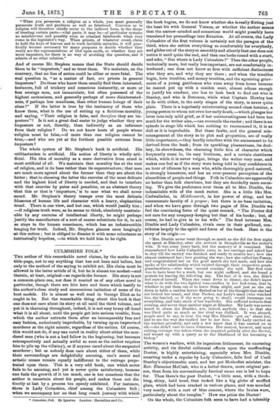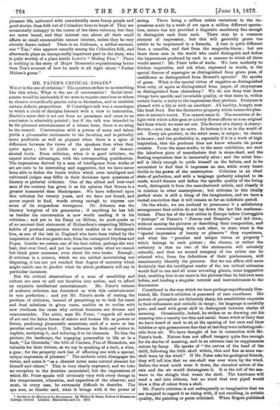CULMSHIRE FOLK.*
THE author of this remarkable novel claims, by the motto on his title-page, not to say anything that has not been said before, but -only in the method of the saying to exhibit art. His claim must be allowed in the latter article of it, but he is almost too modest—and therein, at least, original—as regards the former. His story is not -a common-place one, nor does it remind us of any other novel in particular, though there are bits here and there which testify to the author's close study and unconscious imitation of some of the best models. He is almost as well read in George Eliot as he -ought to be. But the remarkable thing about this book is that -one does not care about its story at all until the third volume, and zet it is charming throughout, indeed, it is not easy to say off-hand what it is all about, until the people get into serious trouble, from which the author extracts them after an incomparably free and -easy fashion, audaciously improbable, by turning up an improvised murderer at the right minute, regardless of the unities. Of course, this would not do, if any one cared in reality about either the mar- liered man (who is not a bad fellow in the beginning, but becomes retrospectively and actually awful so soon as the author requires 'him to pile up the villainy), or if anyone cared about the suspected -murderer ; but as nobody does care about either of them, while their surroundings are delightfully amusing, one's moral and artistic senses remain equally indifferent to the outrage perpe- trated upon them. This is a very odd book, one which never fails to be amusing, and yet is never quite satisfactory, because -one feels the growth of it too much, one is too conscious that the author is uncertain about his people, and makes them out dis- tinctly at last by a process too openly exhibited. For instance, there is Lady Culmshire, chief among the Culmshire folk ; when we accompany her on that long coach journey with which
* Culmshire Folk. By Ignotus. London: Macmillan and Co.
the book begins, we do not know whether she is really flirting just the least bit with General Vernon, or whether the author means
that the narrow-minded and censorious world might possibly have translated her proceedings into flirtation. At all events, the Lady Culmshire of the first volume is certainly not the paragon of the third, when she settles everything so comfortably for everybody, and glides out of the story so smoothly and silently that one does not notice it until quite the end, and then one looks round with a start, and asks, "But where is Lady Culmshire ?" Then the other people, technically more, but really less important, are not comfortably in- troduced; one does not know at first with sufficient distinctness who they are, and why they are there ; and when the troubles begin, love troubles, and money troubles, and the agonising griev- ances of a young gentleman who runs away from home because he cannot put up with a maiden aunt, almost odious enough to justify his conduct, one has to look back to find out who is Stanley, and who is Bateman, while what Captain Howley has to do with either, in the early stages of the story, is never quite plain. There is a hopelessly uninteresting second-class heroine, a young person to whom not even her early death,—which plunges her lover into only mild grief, as if her uninterestingness had been too much for the writer also,—can reconcile the reader ; and there is an episode in stage life which has nothing to recommend it, it is as dull as it is improbable. But these faults, and the general mis- management of the story as to plot and proportion, are of really little importance,—they hardly interfere with the amusement to be derived from the book ; from its sparkling pleasantness, its drol- lery, its shrewdness, the charming little bits of character which frequently come in, its easy liveliness, and a certain chattiness which, while it is never vulgar, brings the writer very near, and makes one feel as if the story were being told in lazy confidence in an hour of idleness by a man who, while thoroughly good-natured, is strongly humorous, and has an ever-present perception of the absurdities of people and things. Folk in Cal mshire are apparently no better than folk elsewhere, but they are decidedly more amus- ing. We give the preference over them all to Mrs. Dimble, the indomitable wife of the meek rector. She is a little like Mrs. Cadwallader, in Middlentarch, in her power of sting, and her consummate faculty of a propos ; but there is no base imitation, and when we have gone through two pages of Mrs. Dimble we feel the convincing force of the quiet remark, "The Doctor did not care for any company-keeping but that of his books ; but, of course, he had to give in to his wife." The feud between Mrs. Dimble and Lady Culmshire, rivals once in their girlhood, con- tributes largely to the spirit and force of the book. Here is the story of its origin :— " Mrs. Dimble never went through so much as she did the first night she spent at Elmsley, after she arrived in Shingleville as the rector's wife. It was some years back, but the memory of it remained. She remembered how Lady Culmshire came in her carriage and asked her to stay till the rectory was finished and ready to receive her ; how she almost embraced her; how gushing she was ; how she called her Fanny, and congratulated her on the good match she had made, and how she spoke of the relationship which existed through their respective groat- grandmothers,—who were 'second cousins,' she said. Her first visit was to have been for a week, but one night sufficed, and she found a pretext for leaving the following day. The fact of it was, she didn't feel sure of herself. When she came down to dinner, she didn't know what to do with the two lighted wax-candles in her bed-room, that is, whether to put them out or to leave them alight, and just as she sat down to table a sudden horror flashed on her at the thought that she had not locked her trunk, and that Parker, my Lady's maid (who watched her, she fancied, as if she were going to steal), would rummage out everything, and take stock of her wardrobe. She suffered tortures that evening, and never slept another night at Elmsley. My Lady was never heard to abase the Dimbles, nor, indeed, anybody else ; so that she was liked quite as much as her rival was disliked. It was absurd, people used to say, to hear the way Mrs. Disable got on' about her, and to see the way she toadied her to her face. My Lady carried on the warfare privately, and only a few knew that it was carried on at all,—she didn't care to have witnesses. Her neatest, keenest, and most cutting revenge was taken when she inquired politely after the Doctoi, and wound up with a query as to the likelihood of his becoming a bishop."
The women's warfare, with its ingenious littlenesses, its unceasing activity, and its direful collateral effects upon the unoffending Doctor, is highly entertaining, especially when Mrs. Dimble, smarting under a repulse by Lady Culmshire, falls foul of Cecil Stanley's objectionable aunt, and her pet Methodist minister, the Rev. Ebenezer McCosh, who is a better drawn, more original per- son, than from his conventionally farcical name one is led to hope for. Then there's the poor Doctor, "a little man, with a throb- bing, shiny, bald head, that looked like a big globe of muffled glass, which had been cracked in various places, and was mended very neatly, with a sort of blue cement, where the brains were, particularly about the temples." How one pities the Doctor!
On the whole, the Calmshire folk seem to have had a tolerably pleasant life, enlivened with considerably more funny people and good stories, than folk out of Culmshire have to boast of. They are occasionally unhappy in the course of the three volumes, but they are never bored, and they interest one about all their small affairs as small communities cannot interest, unless they be very cleverly drawn indeed. There is an Irishman, a soldier-servant, one "Tim," who appears casually among the Culmshire folk, and afterwards plays an unexpectedly important part in the story, who is quite worthy of a place beside Lever's "Mickey Free." There is nothing in the story of Major Monsoon's requisitioning better than Tim's account of how he made it all right about "Father Malone's goose."



































 Previous page
Previous page